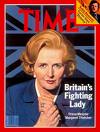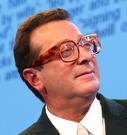The Centre for Policy Studies (CPS) claims its 'role in developing the policies of privatisation, low-tax government and support for the family, is recognised across the world.'
![]()
 The CPS was to some extent an outgrowth of the Institute of Economic Affairs. Keith Joseph (pictured), an active member of the IEA and head of policy for the Conservative Party, and Margaret Thatcher, who had also been associated with the IEA, founded the CPS in 1974. Whilst the IEA pledged itself to be ‘independent of any political party’ and therefore did not publish policy recommendations, the CPS was set up to formulate free market policies for the Tory Party.
It seldom exceeded seven full time employees and an annual budget of £150,000.
The CPS was to some extent an outgrowth of the Institute of Economic Affairs. Keith Joseph (pictured), an active member of the IEA and head of policy for the Conservative Party, and Margaret Thatcher, who had also been associated with the IEA, founded the CPS in 1974. Whilst the IEA pledged itself to be ‘independent of any political party’ and therefore did not publish policy recommendations, the CPS was set up to formulate free market policies for the Tory Party.
It seldom exceeded seven full time employees and an annual budget of £150,000.
The CPS has been accused of being an ‘intellectual jackdaw, gleaning most of its ideas from overseas experiments — and in particular from the US. These were then reworked to fit Britain, packaged in pamphlet form and fired across the media’s bows.’
These think tanks, particularly the CPS, played a major role in setting the policy agenda of the Thatcher government, providing it with most of its policy initiatives, including trade union ‘reforms,’ privatization of public authorities such as water and electricity, and welfare cuts. Thatcher’s chief of staff, economic adviser and all four heads of the No 10 Policy Unit were former contributors to the CPS. The Policy Unit served as a conduit for ideas from CPS and other conservative think tanks.
 Once in power Thatcher set about implementing the economic ideology she had been imbued with including monetarism, privatization and government spending cuts. Such policies met with much opposition, including within her own conservative party, especially as unemployment and business bankruptcies increased. But Thatcher refused to turn away from her fundamentalist path. She told a 1980 Party conference ‘Turn if you like… The lady’s not for turning’. She became, before the Falklands War, the most unpopular prime minister in British polling history. Following the Falklands War she was re-elected with a landslide.
Once in power Thatcher set about implementing the economic ideology she had been imbued with including monetarism, privatization and government spending cuts. Such policies met with much opposition, including within her own conservative party, especially as unemployment and business bankruptcies increased. But Thatcher refused to turn away from her fundamentalist path. She told a 1980 Party conference ‘Turn if you like… The lady’s not for turning’. She became, before the Falklands War, the most unpopular prime minister in British polling history. Following the Falklands War she was re-elected with a landslide.
 The CPS had a turnover of around £500 in 2007. The current chair of CPS is Maurice Saatchi (pictured), co-founder of advertising firm, Saatchi and Saatchi. He was made a Lord in 1996 and 'served on the Conservative Front Bench in the House of Lords as Shadow Minister for the Treasury and the Cabinet Office between 1999 and 2003'.
The CPS had a turnover of around £500 in 2007. The current chair of CPS is Maurice Saatchi (pictured), co-founder of advertising firm, Saatchi and Saatchi. He was made a Lord in 1996 and 'served on the Conservative Front Bench in the House of Lords as Shadow Minister for the Treasury and the Cabinet Office between 1999 and 2003'.